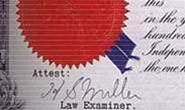
The central issue of In Re Bilski was the question of whether an abstract concept, that is, a purely mathematical algorithm or 'process', could be made intellectual property by patent.
The appeals court upheld the Board in affirming USPTO rejection of the patent application.
The Bilski appeal was thoroughly argued before the entire Court sitting en banc, and the case attracted a three page list of amici curiae briefs submitted by interested third parties.
In its ruling, the appeals court relied on prior US Supreme Court decisions to limit 'process' patents eligibility to specific claims that are "tied to a particular machine or apparatus, or... transforms a particular article into a different state or thing."
Essentially, this Bilski decision invalidates most business method patents that don't specify innovations in machinery or physical processes, though it also seems to leave a loophole for 'process' claims involving particular transformations of the representations of some things.
And in practice, such business method patents as have already been granted by the USPTO will have to be legally challenged before the USPTO in order to be formally invalidated.
However, this ruling also places in jeopardy many software patents that have been granted over the years, especially since the 1998 State Street Bank decision. That case had affirmed patent protection for a mutual fund management system, and it led to an explosion in patent applications from financial firms and software companies, all of which are now in question.
In-depth analysis of the legal, business and software patent implications of this ruling is just beginning, and the appellate court's text including the decision itself, a concurring opinion, and two dissenting opinions, runs to 132 pages.



.png&h=140&w=231&c=1&s=0)
_(36).jpg&h=140&w=231&c=1&s=0)





 iTnews Executive Retreat - Security Leaders Edition
iTnews Executive Retreat - Security Leaders Edition
 iTnews Cloud Covered Breakfast Summit
iTnews Cloud Covered Breakfast Summit
 Melbourne Cloud & Datacenter Convention 2026
Melbourne Cloud & Datacenter Convention 2026
 The 2026 iAwards
The 2026 iAwards












_(1).jpg&h=140&w=231&c=1&s=0)



